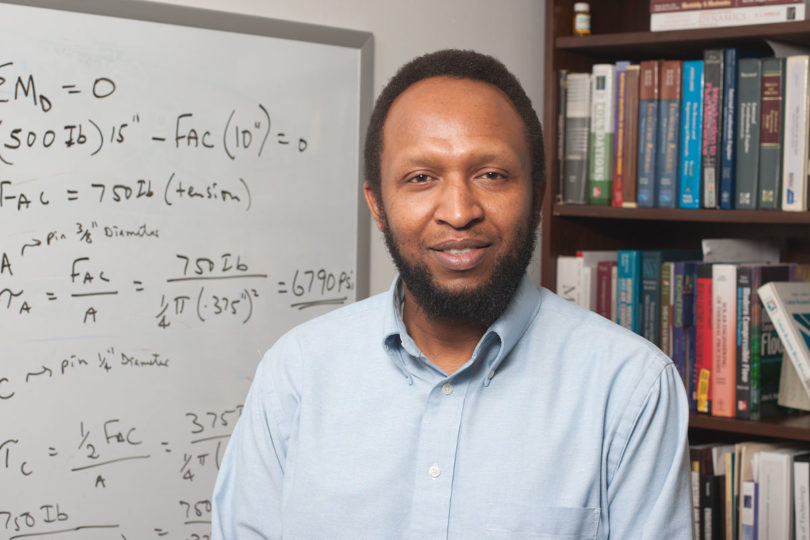“Growing up in the sea port city of Mombasa, Kenya, among the trucks and heavy equipment by the docks, it was natural for me to be inquisitive,” he said.
Particularly of interest to Mativo was how the vehicles were designed, a fascination that eventually led him to the fields of technology and engineering. From working with vehicles to college students, industry and the U.S. military, Mativo has pursued a range of research interests.
Dedicated to the enhancement of science, technology, engineering and mathematics or STEM education through the engineering design process, Mativo also has worked with high school students to develop their understanding of the combination of math and science to produce engineering solutions.
“According to the engineering design process, after identifying a problem, you have to predict a solution that is primarily based on math and science,” said Mativo. “The engineering process is all about trying to figure out how your solution is going to function before you build it.”
As co-principal investigator on a grant from the National Center for Engineering and Technology Education, Mativo worked with colleague Robert Wicklein (principal investigator), a professor of workforce education, to examine the learning effects of design strategies on high school students.
The study compares the use of the engineering design process’ predictive analysis versus the trial and error methodology in the technology education process to solve the same problem.
While other young boys were playing with toy cars—mimicking the roar of their engines—John Mativo was more interested in how the real thing worked.
Mativo’s educational research interests also have extended to his service where he is currently advising the Georgia Department of Education on curriculum matters stemming from the addition of engineering to technology education.
In addition, Mativo and another UGA colleague Chi Thai, an associate professor of biological and agricultural engineering, brought the Junior Engineering Technical Society’s Tests of Engineering, Aptitude, Mathematics and Science or TEAMS competition to UGA last year. The national competition enables high school students to discover engineering through the application of math and science in answering questions about everyday world challenges. This year’s challenge, entitled “Water, Water Everywhere,” is a daylong competition that will be held during Engineering Week beginning Feb. 17 at UGA.
Mativo’s ability to employ the engineering design process to these challenges has enabled him to work with the U.S. Air Force, with whom he is performing ongoing research on thermoelectrics, specifically energy-harvesting devices.
“My ultimate interest is to harvest energy from wasted heat,” he said. “We have heat dissipating from many sources such as vehicles, buildings, the sun, the body, and most of this heat is wasted.”
During the summers of 2008 and 2009, Mativo worked with the Air Force to design devices that will convert that wasted heat into electricity, a goal that he believes, if achieved, will significantly contribute to society.
Mativo’s experiences with the Air Force enable him to provide real-world applications to his students, particularly in his energy systems classes, wherein different types of energy, as well as how to capture and use them efficiently are explored.
Mativo teaches both undergraduate and graduate students who are aspiring to become engineering and technology teachers or to work in the industry. He has published many articles on integrating engineering basics in the secondary and post-secondary curriculum.







